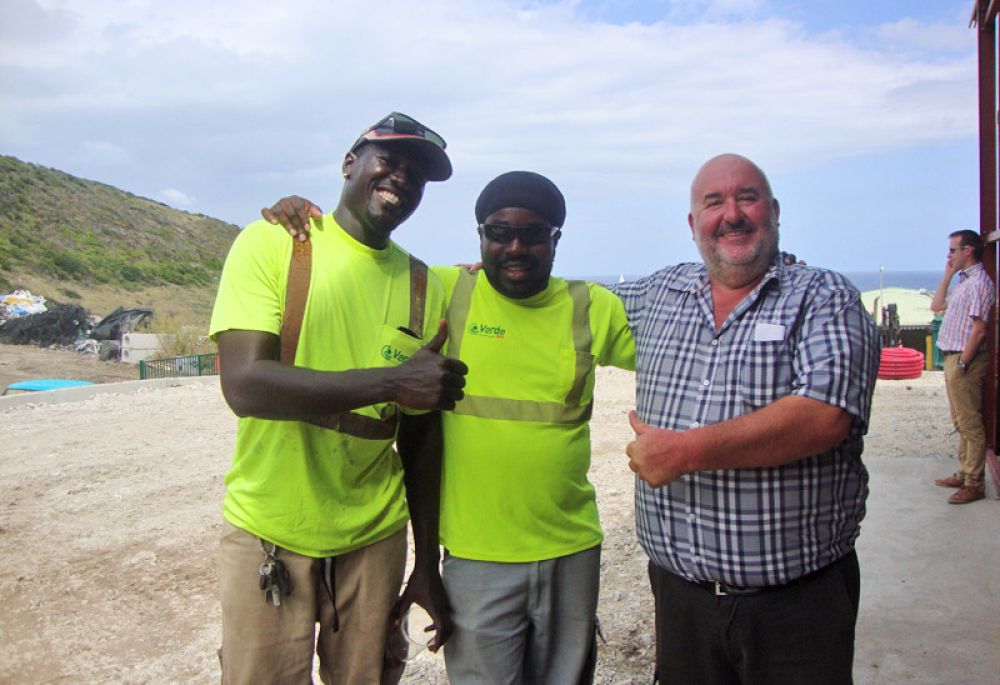The waste oil market
How did you get the idea to create your company?
I got the idea from my bosses, Patrick Villemin and Jean-Pierre Tey. When they got the waste oil collection contract, they suggested that I start my own business. I thought it over and opened my business in June 2015.
What difficulties did you encounter?
I really didn’t encounter any difficulties. I contacted Initiatives Saint-Martin Active, but since the funding took too long, I had to use my own savings to get me the truck while the pumping system belongs to Verde SXM.
What does your job involve? How are you organized? Who are your customers?
My company has two activities: the collection of waste oils and high-pressure washing (hot or cold water). I wash heavy equipment, walls, facades. And I also have the opportunity to wash kitchens at the end of the season. In general, I do washing on weekends and holidays when other people aren’t working. For example, I washed the school campus (latest cleaning) on January 1 - 3.
For waste oils, most of my customers are garage owners (cars or boats). Some require two or three visits a month with 1000 liters (25 gal.) to be collected at every visit. I make arrangements to make a round at the end of every month. When new customers call me, I go do a collection for the first time, and then I add them to my round. The collection is free for the customers. Verde Sxm pays me by the ton. And the ADEME pays Verde. Once I’ve collected the oil, I deliver a “waste tracking” slip which is to be shown in case of an inspection.
How would you describe the evolution of your activity? Its potential for development?
I’m starting to have more and more work. My turnover has doubled. I’m thinking about also handling used frying oils. I’m looking for a site where I could store them until I have enough for a shipment. The problem is that you have to pay to have them processed in the mainland. And I don’t know if customers here are ready to pay. I’m currently in the process of gathering information.
What are the difficulties of your job?
Sometimes some garage owners who have their tank outside leave it open which allows water to get inside. Water decreases the value of the oil. The Adam bills Verde, so they lose money and so do I. I try to explain to them, but they don’t always comply. Some don’t provide me with any access, either. I have a 20-foot hose and there are places where I have to move the tank when I’m not supposed to do that.
Benefits?
What’s nice is that you have a lot of time for yourself once you’re organized. Basically, you need a week and a half per month to go around the island if you want to do a thorough job. You work maybe a little more than 7 hours a day, but after that, you’re free to do what you want.
Do you need any special training?
I had to attend a course on “Hazardous materials”. The Hope Estate Driving school didn’t have enough candidates, so I had to go to Guadeloupe. It lasts two weeks and costs €1800. I also have a carrier certificate (the Collectivité implemented a five-day training course for 300 €) and a truck driver’s license.
Would you recommend a career in the green economy to young people?
Of course! First of all, because it pays good money and also because Saint-Martin must develop this sector. And secondly, recycling is important for keeping the island clean. There’s work. You shouldn’t get discouraged. You have to stay motivated. I always have a lot of work. My motto? Have one goal per year and not stop until you accomplish it.
Photo credits: Verde SXM (from left to right: José Duzanson Foreman, Marc Laguerre Reception, Jean-Pierre Tey Manager)






